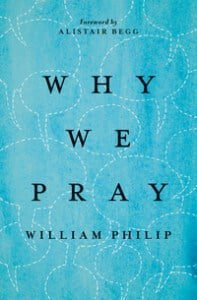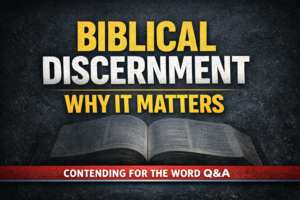⏱️ Estimated Reading Time: 4 min read
 In January here at Servants of Grace, we considered the topic of prayer. I’m convinced that many Christians struggle with prayer because they struggle with guilt and shame. Prayer is essential to the Christian life. Jesus bled, died, rose, and now serves as High Priest, Intercessor, and Advocate for His people. The summons of Jesus is to come before His throne of grace (Hebrews 4:16). His throne is not one of judgment, but of grace. This is why I was encouraged to read Why We Pray by William Phillip, a book that doesn’t just help us think about why we should pray but focuses on four seasons that will help God’s people to pray. These four reasons are: We pray because God is a speaking God, we are Sons of God, God is sovereign, and because we have the Spirit of God.
In January here at Servants of Grace, we considered the topic of prayer. I’m convinced that many Christians struggle with prayer because they struggle with guilt and shame. Prayer is essential to the Christian life. Jesus bled, died, rose, and now serves as High Priest, Intercessor, and Advocate for His people. The summons of Jesus is to come before His throne of grace (Hebrews 4:16). His throne is not one of judgment, but of grace. This is why I was encouraged to read Why We Pray by William Phillip, a book that doesn’t just help us think about why we should pray but focuses on four seasons that will help God’s people to pray. These four reasons are: We pray because God is a speaking God, we are Sons of God, God is sovereign, and because we have the Spirit of God.
In chapter one, the author explains, “We pray because God is a speaking God. Prayer derives from who and what God is, and the great feature of the God of the Bible, the God of the Bible, the God of the Christian faith, is that he is a speaking God” (21-22). In this chapter, we’re taken on a tour de force through the creation story. Along the way, the author points man’s rebellion and the hope of Christ. Each chapter ends with reflection questions that are worth thinking through as they will help address areas in your life and what you’re learning as you read this book. Chapter two sets forth that, “the very essence of prayer is simply answering God in the call that comes to us in Jesus Christ. Prayer is responding to Jesus. We can pray because God is a speaking God, because we have been created to respond to him, and because through Jesus Christ we have been redeemed that we might again respond to him” (42). The rest of this chapter looks at the relationship of our adoption in Christ and how this doctrine affects our prayer lives. Chapter three considers the topic of a sovereign of God by looking at the logic of God’s sovereignty in salvation and in prayer. Here the author notes, “The sheer privilege of prayer, which is granted to us—to be involved in God’s great purpose of salvation as partners in his family business, because he is sovereign, and because he will accomplish everything he has purposed by his grace. We have been given the inestimable privilege of being part of the team that will not only accomplish the purpose but also share in the glory” (78). The author also helps us understand the purpose of prayer when he explains, “God wants us to be on his pitch, thinking his thoughts after him, playing our part in a certain, glorious victory, the bringing in of the kingdom of his Son. And the more we think his thoughts after him, the more we’ll rejoice in talking about those thoughts with him, and with one another, in prayer” (80). The final chapter helps us to consider the Holy Spirit and our prayer lives. Here the author teaches that “Only the Holy Spirit can make us real pray-ers” (85).
Why We Pray is an excellent book on prayer. This book doesn’t major on “how-to” advice on prayer. Instead, it shows us the relationship of God’s Word to our prayer lives. In other words, this help book will help readers to apply God’s Word to our prayer lives. The Puritans were well-known for helping God’s people apply God’s Word to their lives so that they would become like Christ. This is what Why We Pray does so well. It will help you to apply what you believe from God’s Word to your prayer life. Trust me when I say this is not a small thing—it is foundational and paradigm shifting. I highly recommend this book and pray the Lord would powerfully use it to help you grow in your walk with God.



